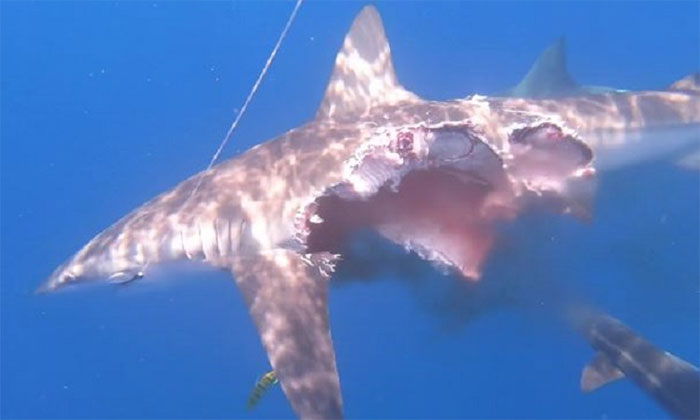The blacktip shark was severely injured by a group of other sharks that bit off most of its lower body, yet it managed to escape and continue hunting before succumbing to its wounds.
The shark survived for an additional 20 minutes after the attack. (Video: Mario Lebrato)
Dr. Mario Lebrato, a 35-year-old scientist from Spain, captured rare footage off the coast of Mozambique, at a depth of 1 to 2 meters below the Indian Ocean. When Lebrato and his colleagues released the blacktip shark into the sea, a group of other sharks surrounded it, inflicting a series of fatal wounds.
According to the researcher, among the sharks that approached were several bull sharks, some weighing between 300 to 400 kg. Despite the collective attack and the loss of most of its lower body, the blacktip shark still fought back and swam away. Lebrato noted that the shark struggled for about 20 minutes before dying from its severe injuries. “While the behavior of sharks eating other sharks is widely known, it is very difficult to capture on film,” Lebrato stated.

The shark was bitten in half before dying from its severe injuries.
In 2019, a group of fishermen witnessed a life-and-death struggle between two great white sharks off the coast of Miami, Florida. The footage they recorded provided evidence for the hypothesis that sharks cannibalize each other as a food source. At that time, Professor Mark Meekan from the Australian Institute of Marine Science stated that many different shark species exhibit cannibalistic behavior. He noted that such attacks are increasing due to human impact.
Previous studies have shown that sharks have been cannibalizing each other for over a millennium. Examination results indicated that fossil samples taken from the prehistoric shark species orthacanthus, which swam across the oceans 300 million years ago, contained juvenile shark teeth. This demonstrates that cannibalistic behavior is a fundamental characteristic of sharks.


















































